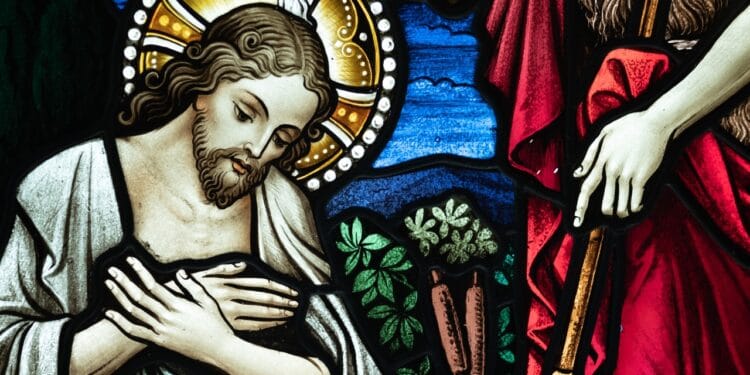No products in the cart.
Can You Ascent To Heaven Without Being Baptized
This post contains paid and/or affiliate links. I make a small commission at no extra cost to you. Please see our Privacy Policy.
Many people wonder about spirituality and heaven. They ask if you can go to heaven without baptism. This question touches on many religious beliefs, leading to different views. Let’s look at baptism and salvation to understand better.
Understanding Baptism in Different Faiths
Baptism is a big deal in many religions, like Christianity. It means being purified and joining the Christian community. But, its role can vary between different churches:
- Catholicism: Baptism is key for salvation, washing away original sin.
- Protestantism: Many see baptism as important but not necessary for salvation.
- Orthodox Christianity: Like Catholicism, baptism is vital for sin forgiveness and church entry.
The Concept of Salvation
Salvation is central in many religions. In Christianity, believing in Jesus is seen as essential for heaven. This makes people wonder: can faith alone get you to heaven, even without baptism?
John 3:5 (NIV)
“Jesus answered, ‘Very truly I tell you, no one can enter the kingdom of God unless they are born of water and the Spirit.’”
Faith vs. Rituals
There are different views on this. Here are some:
- Personal Faith: Some say true faith in God and Jesus can save you, baptism or not.
- God’s Mercy: Many think God’s mercy can go beyond rituals. Sincere seekers, even without baptism, might reach heaven.
- Implicit Faith: Some theologians believe living a good life and following spiritual values can get you to heaven, even without baptism.
Biblical Perspectives on Baptism and Salvation
The Bible has verses that can be seen in different ways. Key ones include:
- Mark 16:16: “Whoever believes and is baptized will be saved, but whoever does not believe will be condemned.” This suggests faith and baptism are both needed.
- Ephesians 2:8-9: “For by grace you have been saved through faith, and that not of yourselves; it is the gift of God, not of works, lest anyone should boast.” This verse emphasizes faith as the path to salvation.
- Luke 23:43: “Truly I tell you, today you will be with me in paradise.” Jesus spoke these words to a criminal who hadn’t been baptized but showed faith in him.

Real-Life Cases and Thoughts
Many stories and teachings show that true belief and actions can go beyond rituals. Here are some examples:
- A person who never heard of baptism but lives a life of service and love.
- Individuals who can’t be baptized due to illness but keep a strong faith.
- People baptized in different ways with different beliefs about baptism’s role in salvation.
Mark 16:16 (NIV)
“Whoever believes and is baptized will be saved, but whoever does not believe will be condemned.”
Concluding Thoughts
The question of ascending to heaven without baptism makes us think about faith, grace, and living a good life. The variety of views within religions shows the depth and complexity of spiritual beliefs. While baptism is important for many, it’s also key to consider personal faith and life values.
Exploring these topics reminds us that spirituality is about personal experience and connection with the divine. It’s not just about rituals or church teachings. The search for meaning, love, and acceptance is at the heart of most spiritual journeys.
The Importance of Faith and Spiritual Practices Beyond Baptism
Faith is a deep part of human life, going beyond individual beliefs and practices. Baptism is a big step in many Christian traditions, but faith and spiritual practices are also very valuable.
Exploring these can deepen our understanding of our beliefs and enrich our spiritual journey.
To see the wide range of faith, consider these elements:
- Personal Relationship with God: People are encouraged to have a direct, personal relationship with God. This is not just about baptism. It’s about prayer, meditation, and seeking understanding.
- Community and Connection: Being part of a community of believers helps grow spiritually. Group discussions, studies, and worship create a supportive environment.
- Service to Others: Serving others is key in many spiritual paths. Acts of kindness, volunteering, and community service show faith in action.
- Study and Reflection: Reading sacred texts and literature can deepen understanding. Reflecting on these materials helps find personal meaning and guidance.
- Inner Transformation: Spiritual growth often leads to personal transformation. This comes through self-reflection, self-improvement, and overcoming challenges.
Baptism is a beautiful tradition for many. Yet, neglecting ongoing faith practices and community might limit growth. Prayer, for example, is a direct way to communicate with God and find comfort in hard times.
Acts 2:38 (NIV)
“Peter replied, ‘Repent and be baptized, every one of you, in the name of Jesus Christ for the forgiveness of your sins. And you will receive the gift of the Holy Spirit.’”
In many religious stories, baptism is not the only way to heaven. Sincere faith and living ethically are seen as paths to a spiritual afterlife. Actions like love, kindness, and humility are believed to be as important as baptism.
Many find comfort in daily spiritual practices such as:
- Meditation: It quiets the mind and deepens insight and connection to the divine.
- Journaling: Writing down thoughts and prayers clarifies beliefs and emotions.
- Nature Walks: They bring peace and remind us of creation’s magnificence.
- Art and Creativity: Creative outlets can be a form of worship and faith expression.
Looking beyond traditional rituals is key to fostering spirituality. For many, spiritual practices express their beliefs and enhance their faith journey. Values like forgiveness, gratitude, and love are central in most teachings.
The question of reaching heaven is a common one. Faith, beyond baptism, is in one’s heart, actions, and beliefs.
Being part of a community, serving others, and seeking truth are all important for a meaningful spiritual life.
Exploring faith and practices beyond baptism reveals diverse views:
| Religion | View on Baptism | Other Spiritual Practices |
|---|---|---|
| Christianity | Often seen as essential, yet faith and good works are emphasized. | Prayer, community service, Bible study |
| Buddhism | No concept of baptism; focuses on enlightenment. | Meditation, mindfulness, ethical living |
| Islam | Baptism is not practiced; faith declaration is key. | Prayer, charity, Quran study |
| Hinduism | No formal baptism; rituals vary widely. | Puja, meditation, yoga |
Understanding spirituality needs an open heart and mind. Embracing practices beyond baptism can lead to a fulfilling spiritual journey.
Recognizing the importance of faith in various forms gives everyone the chance to reach heaven through sincere actions and devotion.
Romans 6:4 (NIV)
“We were therefore buried with him through baptism into death in order that, just as Christ was raised from the dead through the glory of the Father, we too may live a new life.”
The journey to heaven is often seen through religious rituals, with baptism being key in many faiths. Yet, spiritual fulfillment and divine acceptance involve more than just baptism. The core of the matter is faith.
Many teachings say belief in a higher power, good intentions, and moral living are vital. Spiritual practices like prayer, meditation, and kindness help grow your faith.
These practices make your life meaningful and align with spiritual values.
Baptism is important in many traditions, but faith, love, and spiritual growth are just as vital.
Each person’s beliefs and experiences shape their view of salvation and ascension. Seeking a true connection with the divine is what matters most, not baptism.
Focus on nurturing your spiritual life. This will guide you on a fulfilling journey, no matter the rituals.












